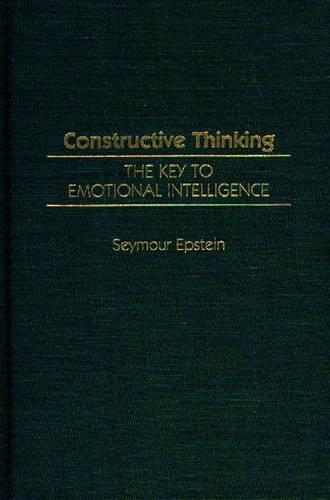
Constructive Thinking: The Key to Emotional Intelligence
(Hardback)
Available Formats
Publishing Details
Constructive Thinking: The Key to Emotional Intelligence
By (Author) Seymour Epstein
Bloomsbury Publishing PLC
Praeger Publishers Inc
27th August 1998
United States
Classifications
Tertiary Education
Non Fiction
Physiological psychology, neuropsychology, biopsychology
Psychological theory, systems, schools and viewpoints
152.4
Physical Properties
Hardback
304
Description
This is a book on how to gain control of one's emotions. It is a serious book that contains a theory of automatic processing it presents and its implications for controlling emotions. Epstein is a professor of personality psychology and a highly regarded research psychologist who has supported his theory with extensive research published in the most demanding professional journals. He was motivated to write the book by the success of a course he taught based on his theory. Students reported obtaining an understanding and control of their emotions that they never thought possible and that they said changed the course of their lives. According to the theory, people operate by two minds, a rational-analytical mind and an intuitive-experiential mind, the latter being intimately associated with emotions. Each mind operates by its own principles and each has its own form of intelligence. The intelligence of the rational-analytical mind is measured by IQ tests and the intelligence of the intuitive-experiential mind (which is related to emotional intelligence) by the Constructive Thinking Inventory (CTI), a test developed by Epstein that is included in the book. By understanding the principles of operation of the intuitive-experiential mind, it is possible to train it as well as to learn from it, and thereby to improve one's emotional intelligence. The book provides exercises for applying the principles in everyday life and a review of a variety of other procedures for improving emotional intelligence. It is suited for use as a primary or supplementary text in courses on improving emotional intelligence or coping with stress as well as for individual reading.
Author Bio
SEYMOUR EPSTEIN is Professor Emeritus of Psychology at the University of Massachusetts, Amherst. A noted authority on personality, he has received continuous research support from the National Institute of Mental Health for over 40 years and has received their coveted Merit Award. He has published extensively, including an earlier trade-oriented version of this book entitled You're Smarter Than You Think (1993).
